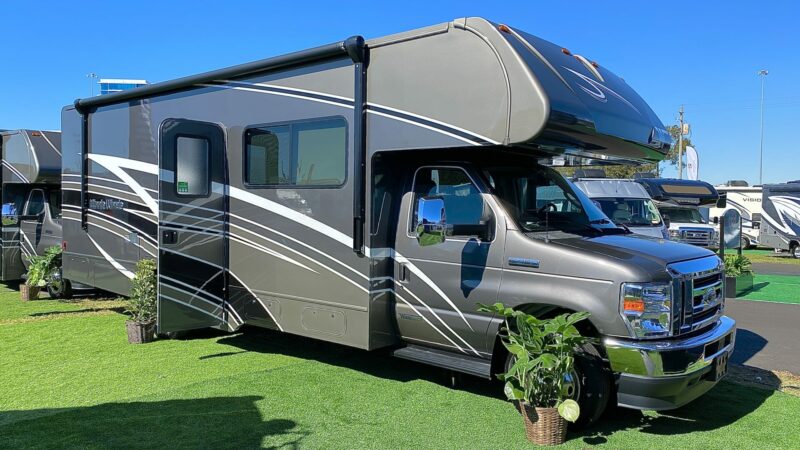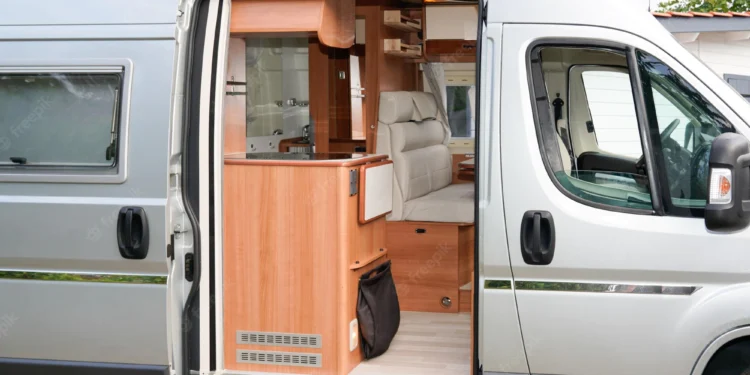If you’re reading this article, it’s probably because you’ve come across the term campervan, van life, or RV and you want to know what they all mean. Let us break it down for you: RVs are motor homes, campers, and trailers under 10 feet in length; vans are passenger cars that have been modified with a removable interior sleeping compartment, and campervans are vehicles specifically made to be towed by a car.
All three of these terms have become popular over the last couple of years largely due to social media and many people use them interchangeably.
RV (Motor Home)

RVs are motor homes with a cabin and a chassis. As the name suggests, they’re designed to be driven around in a caravan or truck. They’re generally larger than campervans, with room for a bed, a kitchen, and some furniture inside. Some RVs are designed for occasional use, while others are set up for long-term touring or living.
While RVs are commonly associated with full-time travel, many people choose to live in them because they’re well suited to long-term nomadism. They can be easily packed up and transported, making them a great living option for people who don’t want a permanent address.
Vanlife
Vans and motor homes often serve as mobile homes, but some van dwellers choose to completely ditch their vehicles and live out of their vans. These are known as “van lifters” or “van nomads.” They do away with the vehicle completely, sleeping on a mattress on the floor or sleeping in a tent.
Some van lifters home-school their kids or teach online classes using their van as a mobile studio. Vans can also function as a home office, where you can conduct business from a space that’s completely mobile. And if you don’t want to be tethered to a particular address, a van can be moved to any parking spot or storage space.
Campervan
Campervans are what the name implies – a van that’s been converted into a camper. People purchase them as camper and then convert them into a van with a bed. There are also custom-built campervans that are designed exactly like a house.
Campervans are a good choice if you want more of a camping experience than RV living, but they aren’t as mobile as RVs. You can park them easily in a campsite or on private property, but you can’t move them around as easily as RVs.

From Dwelling
Living full-time in an RV or van is an extreme lifestyle choice. For some, it’s an exciting adventure and a creative way of living. However, the costs of living long-term in an RV or van are considerable. You’ll need a high-quality campervan to live in, and you’ll also want a large vehicle for things like grocery shopping and for travel.
The lifestyle can also be expensive. You’ll need a comfortable RV, a reliable transport vehicle, and regular maintenance. You may also choose to add luxuries like a swimming pool, a boat, and a jet ski.
Why are people choosing to live in an RV or van?
RVs and vans are perfect for people who love the outdoors, travel, and exploring new places. If you love camping, exploring new places, and seeing the world while staying connected to your loved ones and home, an RV or van might be the best option for you.
On top of that, many people choose to live in RVs and vans because they’re more comfortable than staying at a hotel or motel. You can also open the window and breathe fresh air, and you don’t have to worry about noisy neighbors.
Pros and Cons of RV & Van Living
There are many positive aspects of this lifestyle. RVs and vans are mobile and can be easily moved from place to place. They also provide a comfortable place to sleep and are safe from natural disasters. However, RVs and vans are generally more expensive to buy and maintain than cheaper options and can be tiring to travel in.
The majority of people don’t live full-time in an RV or van. Instead, they’re occasional travelers who use their vehicles as a way to stay connected to their loved ones and the world around them.

Conclusion
RVs are great for traveling the country and exploring new places. They’re more expensive to own and maintain than smaller options, however, so you’ll want to make sure they’re right for you. If you want to live in an RV and travel full-time, you’ll need a high-quality vehicle.
You can stay connected to the world while living in an RV by installing internet and phone service. These options can be expensive to maintain and buy. RVs are also generally more expensive than other options. So, if you love to travel and see the world, an RV is a great option for you.

